The Mad Catz C.T.R.L.i – The AfterPad Review
In the weeks since reviewing the Micro C.T.R.L.i (spoiler alert: I liked it), my opinion of it has stayed positive. Still, while it is a great controller, the Micro C.T.R.L.i does have a few aspects that might keep it from being the best option for many gamers: the size is a bit small for large hands, the analog sticks have a tighter radius, and the iPhone clip doesnât function correctly with larger iPhones. Luckily, Mad Catz is on the scene with the larger, full-size C.T.R.L.i controller. For $10 dollars more than the a cost of $49 Micro C.T.R.L.i, you get a large, Xbox 360 style controller with full analog sticks and a solidly build iPhone grip.
While it would be easy to say âgo read my Micro C.T.R.L.i review and picture a bigger controllerâ, the fact of the matter is, the C.T.R.L.i is different in more ways than just size. There are subtle changes in construction and design that give this controller an identity unique from itâs little brother. Some aspects of this review has been copied over from the review of the Micro C.T.R.L.i when applicable, but much has been rewritten to reflect the changes the larger C.T.R.L.i brings to the table. I hope reading the two reviews will help make the decision of which controller to get a little bit easier.
Design
If the C.T.R.L.i was released a few months ago, itâs mere existence would be enough to earn it the title of Best MFi Controller. However, as weâre now getting a wealth of controller options over the holiday season, it isnât enough for the C.T.R.L.i to merely work correctly as a controller. It has to be comfortable, it has to be well built, and it has to be nice to look at.
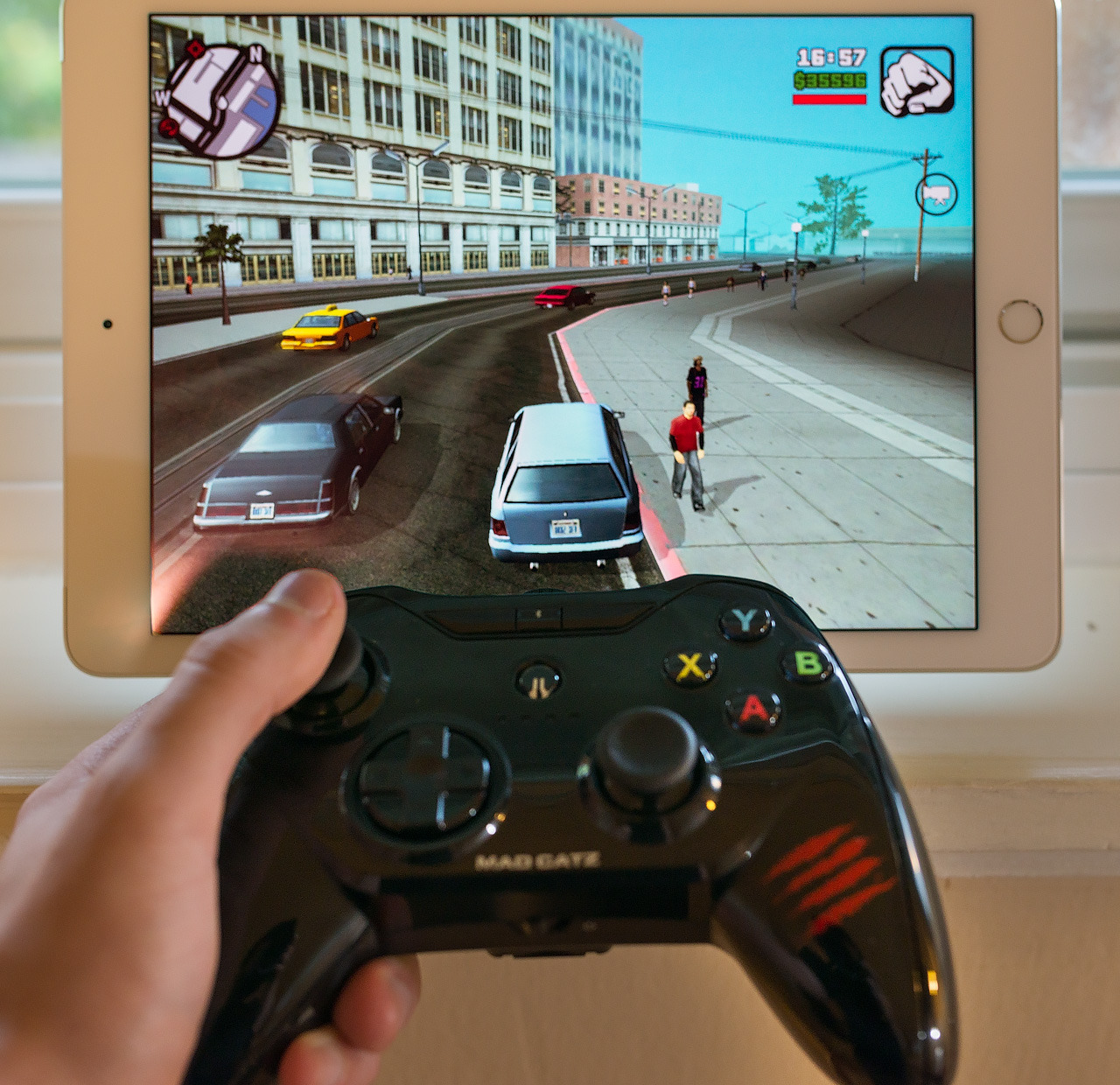
Visuals
The top of the controller is clad in glossy plastic. The version currently for sale is only available in black, but alternate colors are up for presale currently, and will likely be available soon. The right handle grip features a cosmetic touch: some sort of orange-red scratch mark, apparently indicative of the Mad Catz branding. The underside of the controller is a lightly textured matte plastic, with occasional screw holes.
Visually⦠well, it is what it is. Mad Catz has opted for an aggressively-branded âgamerâ focused look. Never mind that these are iOS controllers, and the iOS ecosystem doesnât fit this look in any way. To Mad Catz, their âbrandâ comes first. If you have a ton of other Mad Catz products, then hey, this one will fit right in. If youâre an average iOS gamer looking for an iOS accessory, this one is going to stick out like a sore thumb. Itâs not an objectively ugly controller. Itâs just⦠not a very Apple-ish one.
The underside of the controller features an external battery compartment right out of the Xbox 360 controller design style. The back features a rather large thumb screw which can be removed and re-attached along with the optional iPhone grip.
Feel
The good news is, while the visuals may be a bit overstated, the feel of the C.T.R.L.i is first-rate. Glossy plastic can feel cheap when done poorly, but THIS glossy plastic feels high quality. Fingerprint magnet or not. The matte plastic on the rear of the controller better still. Itâs a world of difference between this matte plastic and the style used by the MOGA and Logitech controllers – this plastic just screams quality. The C.T.R.L.i is obviously influenced strongly by the 360 controller, but the materials used here feel a step above even Microsoftâs last-generation product. The screw holes on the bottom of the controller are present, but arenât noticeable during gameplay. While the controller looks like it is covered in noticeable seams, you wonât feel these seems on your skin during play. You might feel the extruding battery pack against your fingertips if you have larger hands, but itâs no worse than using a wireless 360 controller. This may not be the the seamless, screwless beauty of the Xbox Oneâs controller, but it still feels nice.
Size-wise, the C.T.RL.i is very much on the large side. It is a bit larger even than an Xbox 360 controller, and feels a little heavier as well. If the Micro C.T.R.L.i leans a little towards people with smaller hands, the regular C.T.R.L.i is squarely targeted those with large hands. It is a comfortable, spacious design, and Xbox gamers are going to love it. In the iOS space, only the MOGA Rebel is larger, but itâs very low weight gives it a much less sturdy feel than this Mad Catz design.
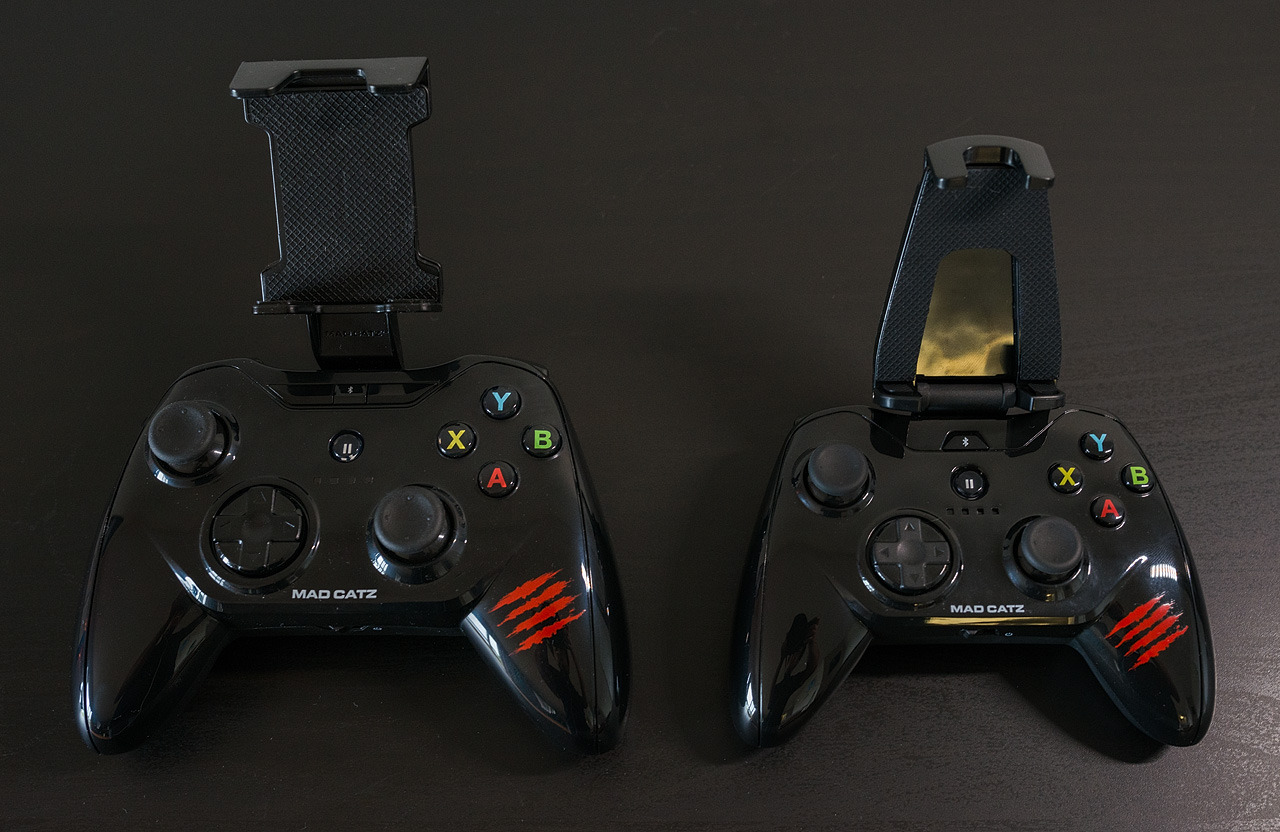
The Controller
Analog Sticks
The C.T.R.L.i is outfitted with two diagonally-staggered analog sticks. Visually, they are almost identical to those of the Xbox 360âs controller – they are coated in a relatively grippy dark gray rubberized exterior, and feature 4 protruding lumps to signify directionality in the middle of lightly concave tips. It is more grippy than the textureless analog sticks of the Rebel, a bit less grippy than the rubberized caps of the Stratus, and comparable to the similarly-designed analog stick caps of the Horipad.
The full-size C.T.R.L.i features noticeably larger and slightly tighter sticks compared with the those of the Micro C.T.R.L.i. This makes it easier to precisely control movement, at the expense of making quick movement from one side to the other a little more strenuous. While I find full-size analog sticks of the regular C.T.R.L.i more pleasant to use, there is nothing inherently wrong with those of the Micro C.T.R.L.i. Much like the design itself of this controller, the analog sticks feel very similar to those of the Xbox 360 controller, in the best way possible. They are far superior to the shrunken sticks of the pocket-sized SteelSeries Stratus controller, and a world of difference from the circle pads of the MOGA Ace Power.
To my medium-sized hands, the full-sized analog sticks of the C.T.R.L.i feel better than the shrunken sticks of the Micro C.T.R.L.i. In the most demanding situations, I found my thumbs slipping from the smaller controllerâs sticks due to the lack of surface area. Using the Micro C.T.R.L.i, I had difficulty running down the path while being chased by a giant boulder in Crash Bandicoot 2, aiming guns accurately for headshots in Call of Duty, and correctly entering stick movement patterns in Jet Set Radio. With the full-sized C.T.R.L.i, these were all easier to accomplish.
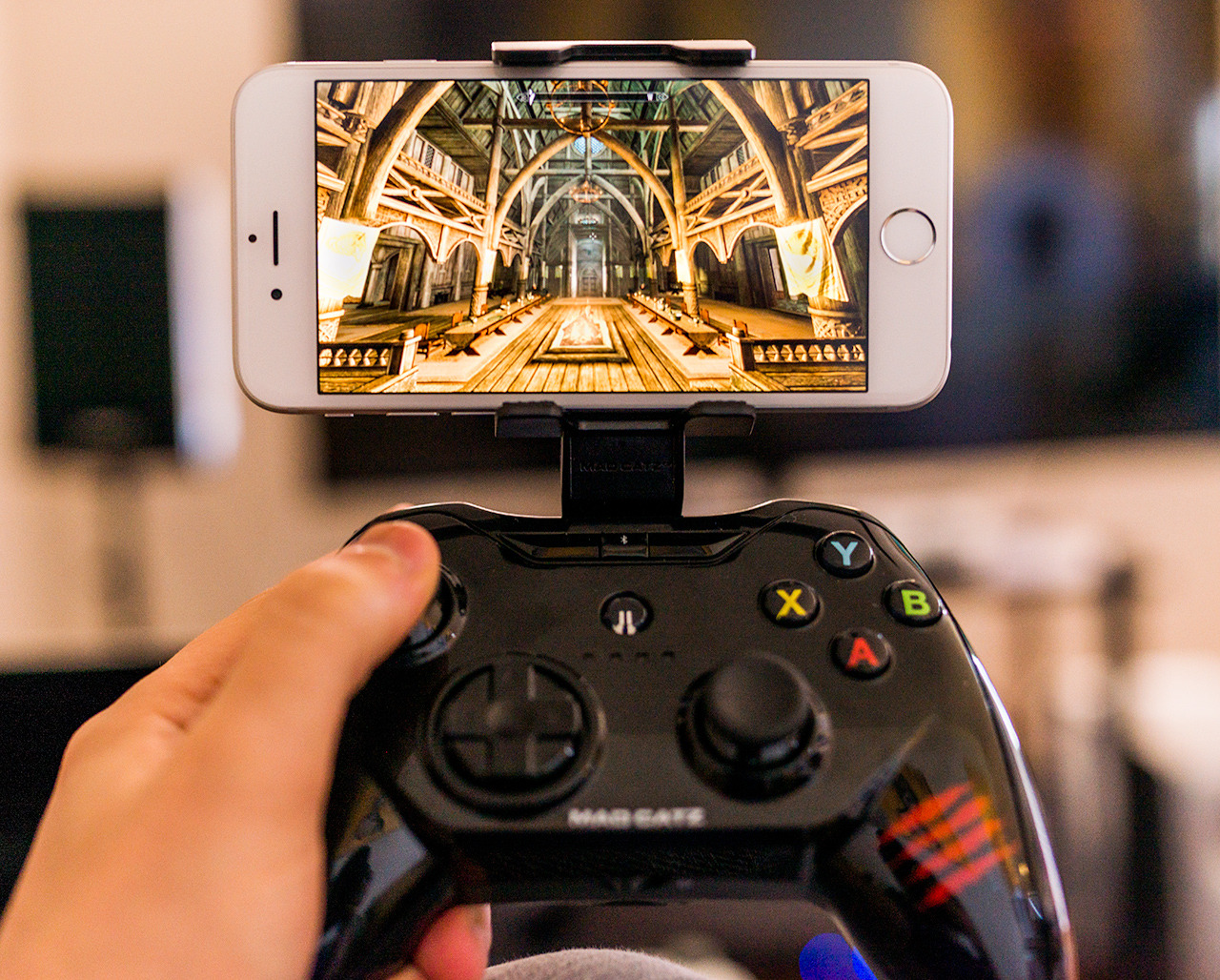
ABXY Buttons
The quality and design of the face buttons is one of the most important aspects of any game controller. How far apart are the buttons? How large are they? How grippy vs smooth are their surfaces? How deep do they press down? These arenât qualities that have a right or wrong answer; they come down almost entirely to matters of personal preference. Button size brings inherent trade-offs in gameplay – it is easier to hit larger and wider spaced buttons without inadvertently touching any other buttons, but at the same smaller buttons are easier to combine-press to create combos.
Size-wise, the face buttons on the C.T.R.L.i are almost identical to what youâd find on an Xbox or PlayStation controller. These are large, luxuriously spaced buttons, without a hint of the âmobile gamingâ feel you get with some of the other controllers. The C.T.R.L.i has the largest, widest spaced buttons of any MFi controller by far, with the one exception of the similarly-sized Horipad. MFi controllers have long tended to feature small, tightly spaced buttons. If youâre a fan of large buttons, the C.T.R.L.i or Horipad controllers will be your best options, as the other large MFi controllers – the MOGA Rebel and SteelSeries Stratus XL – feature significantly smaller and closer buttons than these.
Interestingly, these buttons arenât just larger than those of the Micro C.T.R.L.i; they also feature a completely different design. They are a bit less grippy and more slippery, have flatter surfaces, and travel a bit further when pressed. In feel, they are almost like a glossy version of the PlayStation controllerâs face buttons – wide, large, and flat – with a little bit of additional travel distance. Visually however, they take yet another cue from the 360 controller by featuring a transparent surface which reveals the letter markings beneath, rather than displaying the letters directly on the surface of the buttons, as the Micro C.T.R.L.i does
Ultimately, the face buttons on the C.T.R.L.i are well built, yet very large and spacious. If youâre primarily a mobile gamer, these might feel oversized to you. If youâre a console gamer, youâll be right at home.
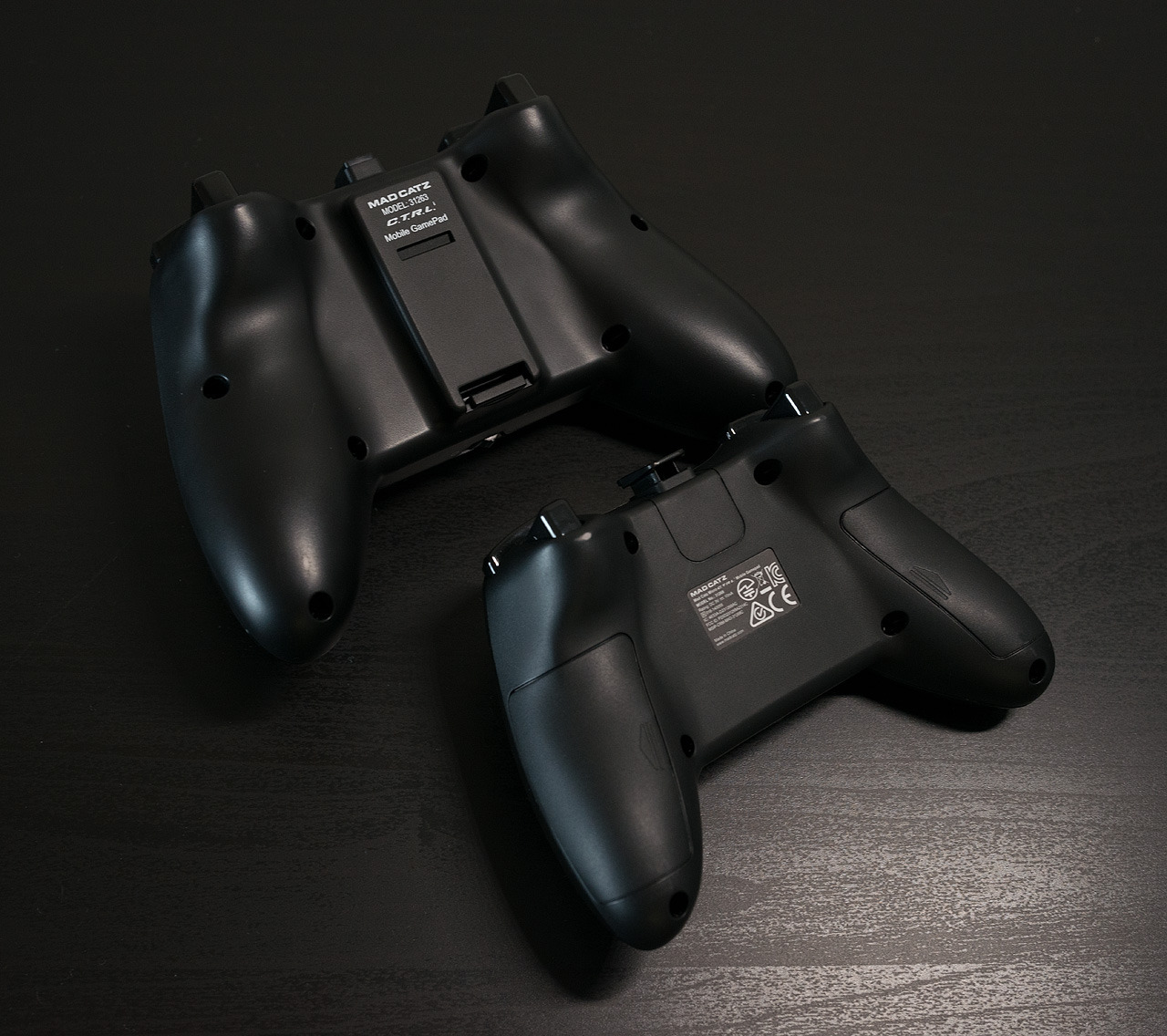
The d-pad
I really wish I could say the d-pad on the larger C.T.R.L.i is better than that of the smaller, but believe it or not, the opposite is true – it actually is WORSE than the already poor d-pad of the Micro C.T.R.L.i. Travel distance feels a little bit reduced, and there is an additional cheap, almost sticky feel to it as itâs pressed down. The one plus side: the Rebel, PowerShell, and Ace Power all have worse d-pads. That might warrant excusing this one, except that the Stratus XL and Horipad were just released, and both feature much better d-pads than this. And again, the little brotherâs d-pad is noticeably better. Itâs a big letdown on an otherwise solid controller.
Iâm not sure what the problem is with MFi controller makers and d-pads. Apple mandates the circular design (although clever engineering allows for exceptions), but plenty of controllers have shipped with decent circular d-pads. Heck, my favorite PlayStation 2 controller features a circular d-pad. SteelSeries did a passable job with the d-pad on their Stratus controllers, and an even better job with the d-pad of the larger Stratus XL. The d-pad on the Razer Junglecat is solid. The d-pad on the newly released Horipad is legitimately great. Not sure why Mad Catz, MOGA, and Logitech keep dropping the ball so badly here.
The d-pad here is bad enough that retro gamers might actually consider it a deal killer and consider another controller option. Sad, because everything else about this controller is far, far better than itâs d-pad.
The Triggers and Shoulder Buttons
The rear input method style is one place that MFi controller makers are allowed a little bit of flexibility by Apple in terms of their approach. Every controller must feature a right and left shoulder bumper button, and Extended-layout controllers like the C.T.R.L.i come outfitted with an additional right and left input. This input can be in the form of two additional shoulder buttons, as in the Horipad and Stratus, or in the form of gun-style triggers, as opted for by the Moga and Mad Catz controllers.
This trigger-style design is generally better for games where precise control is required, such as racing games where the trigger pressure corresponds to acceleration rate; and for games where pulling a trigger makes sense, such as shooters. In games where the lower shoulder is âjust another buttonâ, the trigger metaphor probably makes less sense than including another bumper. Triggers probably make more sense going forwards for new games, with the growing popularity of shooters outpacing most other genres. Retro gamers may prefer controllers with L2 and R2 shoulder buttons instead, as the vast majority of games throughout history were not designed for triggers.
The C.T.R.L.i is a decidedly modern controller, and features standard-style shoulder button on the left and right side and two glossy triggers below them. Unlike the 360 controller, there is no click when theyâre activated. This is because, much like the PlayStation controller, the shoulder buttons are fully pressure sensitive. Moving your pointer fingers from resting on the triggers to hitting the shoulder buttons doesnât require any special finger gymnastics, and is quick and easy to perform under fire. Nothing particularly special to report about the shoulder buttons one way or the other – they work, theyâre easy to hit, and they feel pleasant to the touch.
Beneath the shoulder buttons, we have the triggers. These are squarely in the vein of the Xbox 360 design (no PlayStation 3 nightmare here), are relatively small in size, and centered directly in the middle of their respective shoulder buttons. They require a medium amount of pressure to hit – far lower than the Rebelâs high-pressure triggers, and comparable to the Xbox 360âs triggers. They feel relatively solid, though there is a bit more wobble than on the extremely solid feeling Rebel triggers. Resting your fingers on these triggers does not cause enough pressure to inadvertently activate them – a potentially fatal flaw of the Stratus XL – and is important for games that map precise activities to light trigger pressure.
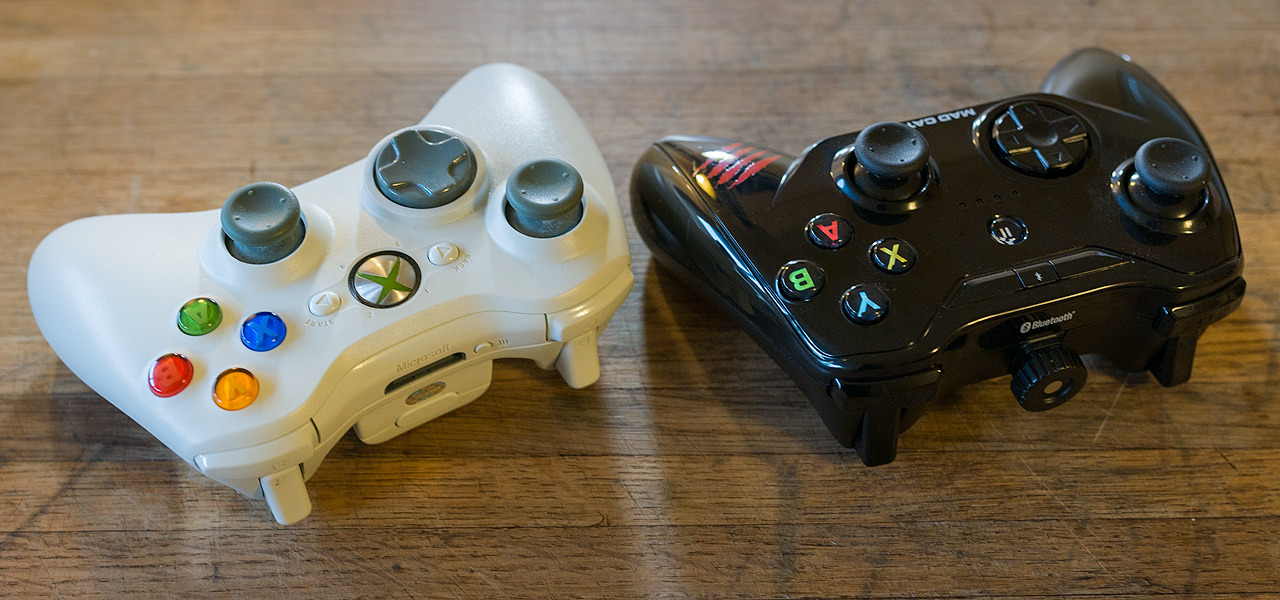
Other Buttons
Rounding out the button selection, the C.T.R.L.i features the MFi-standard Pause button, a bluetooth pair button in the top-center of the controller, and a somewhat odd spring-loaded âpower switchâ along the base of the controller, between the handles. The Pause button feels solid, though you probably wonât spend much time pressing it. The bluetooth pair button looks a little strange on top of the controller, but it likely takes the shape it does to conform with the design of the Android version of this controller, which uses that space to include a series of media controls. Same story for the spring loaded power switch on the bottom of the controller – that space is used to select modes on the Android version, and was probably repurposed for this iOS model.
The Software
A great controller is nothing without working drivers – just ask MOGA . Similarly, any decent controller should come with a way to update drivers to address unforeseen issues without requiring a warranty return or a hunt for a PC to install with – just ask SteelSeries. Anyways, although the C.T.R.L.i line appears to work great out of the box, Mad Catz has answers to both of these problems ready to go.
The Driver
This comes as a breath of fresh air: The drivers for the C.T.R.L.i actually appear to work as advertised. In my week or two of serious play, I didnât encounter any noticable lag, and disconnects were exceedingly rare. This is one of those categories where the less there is to say, the better it is: the C.T.R.L.i works, and it works well. The ball is in your court, MOGA and SteelSeries.
The App
Assuming something does go wrong with the driver, perhaps due to complications with a new iOS update, Mad Catz seems to have things covered. Both the Micro C.T.R.L.i and standard C.T.R.L.i have apps available in the App Store (though each has a separate app for some reason). These apps provide a unified place to check for firmware updates, test controller compatibility, find compatible games, and check battery life – especially important as these controllers are the only MFi controllers not to feature physical battery life indicators.
In practice, the app is as poorly made as MOGAâs effort. The game list is missing many games, takes forever to load, and doesnât indicate compatibility or price. And no, Iâm not just saying that because I run a competing list which is the only way I monetize this site, shame on you for suggesting that! In all honesty though, you probably arenât going to want to trust Mad Catz to maintain this list. None of the other controller makers have done a good job keeping up with game releases, and Mad Catz is a big company with a lot of other priorities.
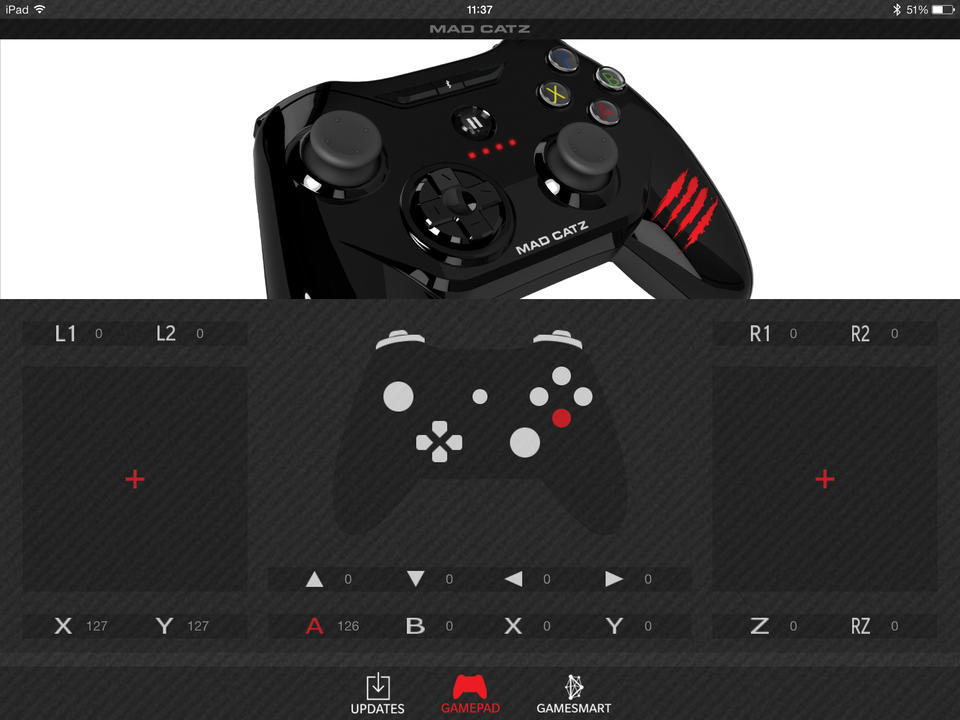
Accessories
The fundamentals of the C.T.R.L.i are strong, and the controller works. But as with some other MFi controllers, Mad Catz has opted to include a few accessories. This is the place where Mad Catz dropped the ball with the Micro C.T.R.L.i; good news is, the story is a bit better with the full sized option.
The iPhone Clip
Many mobile game controllers have long been shipping with some sort of way to dock your phone into them. Mad Catz opts to solve this problem with the C.T.R.L.i by including an attachable iPhone grip. This screws securely to the back of the C.T.R.L.i, and is capable of holding any iPhone model at about a 45 degree angle to the controller.
In practice, using the C.T.R.L.i with the iPhone doesnât quite work ideally, but does work far better than with the Micro C.T.R.L.i design. Itâs clear this controller was designed long before the iPhone 6 line was revealed, as the clip itself is far too large in area to adequately hold the iPhone 6 without touching the volume buttons. Solving this problem means attaching the iPhone off-center or allowing the grip to constantly press down on the volume button – not the best of options. Still, the additional weight of the full-size C.T.R.L.i makes a big difference compared with the Micro C.T.R.L.i, as this controller can actually hold an iPhone 6 without toppling over under itâs own weight. The clip design of the MOGA Rebel is far superior to the Mad Catz offering, but again, the MOGA controller is buggy as hell on iOS 8, and weighs even less.
The clip itself feels well constructed – much better than that of the Micro C.T.R.L.i. Whereas the Micro C.T.R.L.iâs feels cheap and requires a great deal of pressure to attach to the controller (enough to break the clip according to some readers), the regular C.T.R.L.i screws on easily and pleasantly. There isnât anything particularly negative to report about the construction of the larger C.T.R.L.iâs clip – itâs well made, and the iPhone feels secure when attached to it.
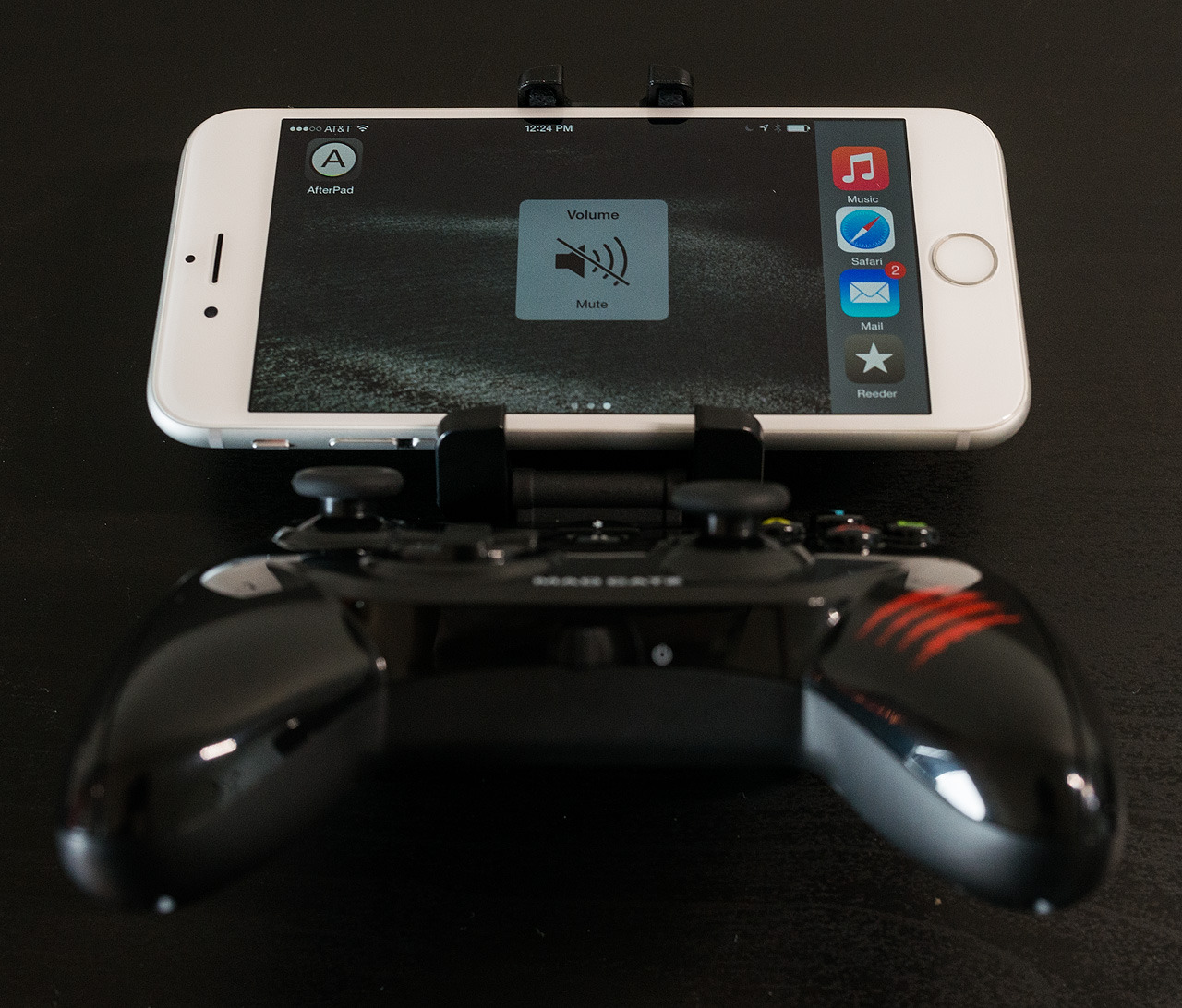
Battery
The batteries themselves are one of my biggest complaints with the C.T.R.L.i controllers. Battery life itself is fine, at about 40 hours. The problem is what happens when those batteries die. Instead of including an integrated battery, Mad Catz opted to outfit their controllers with AAA battery ports. Yes, AAA batteries, those little ones cheap TV remotes tend to require. Not the AA batteries that Apple themselves use in their mouse and keyboard designs, and sell directly from their store. No, Mad Catz again ignores the iOS ecosystem in favor of their own plan. So instead of being able to use the rechargeable AA batteries you may have already purchased from Apple, you have to find some off-brand AAA batteries, and keep them handy when youâre running low on power. Itâs even worse that the larger C.T.R.L.i still uses AAA batteries, as the batteries are kept in an external compartment on the back of the pad. ANY size could have been used there, why opt for these?
Again though, Mad Catz is saved by their competitorsâ dropping the ball. While rechargeable AA or built-in batteries might have been a better option, most MFi controllers with these options donât even work correctly with iOS 8. or feature some sort of crippling flaw that takes them out of contention for most gamers. Having a working controller is always better than theoretical arguments about which battery style is best. In fact, the only really good MFi controller available right now with a rechargeable battery is the Horipad, and that controller will appeal to a VERY different demographic than the C.T.R.L.i
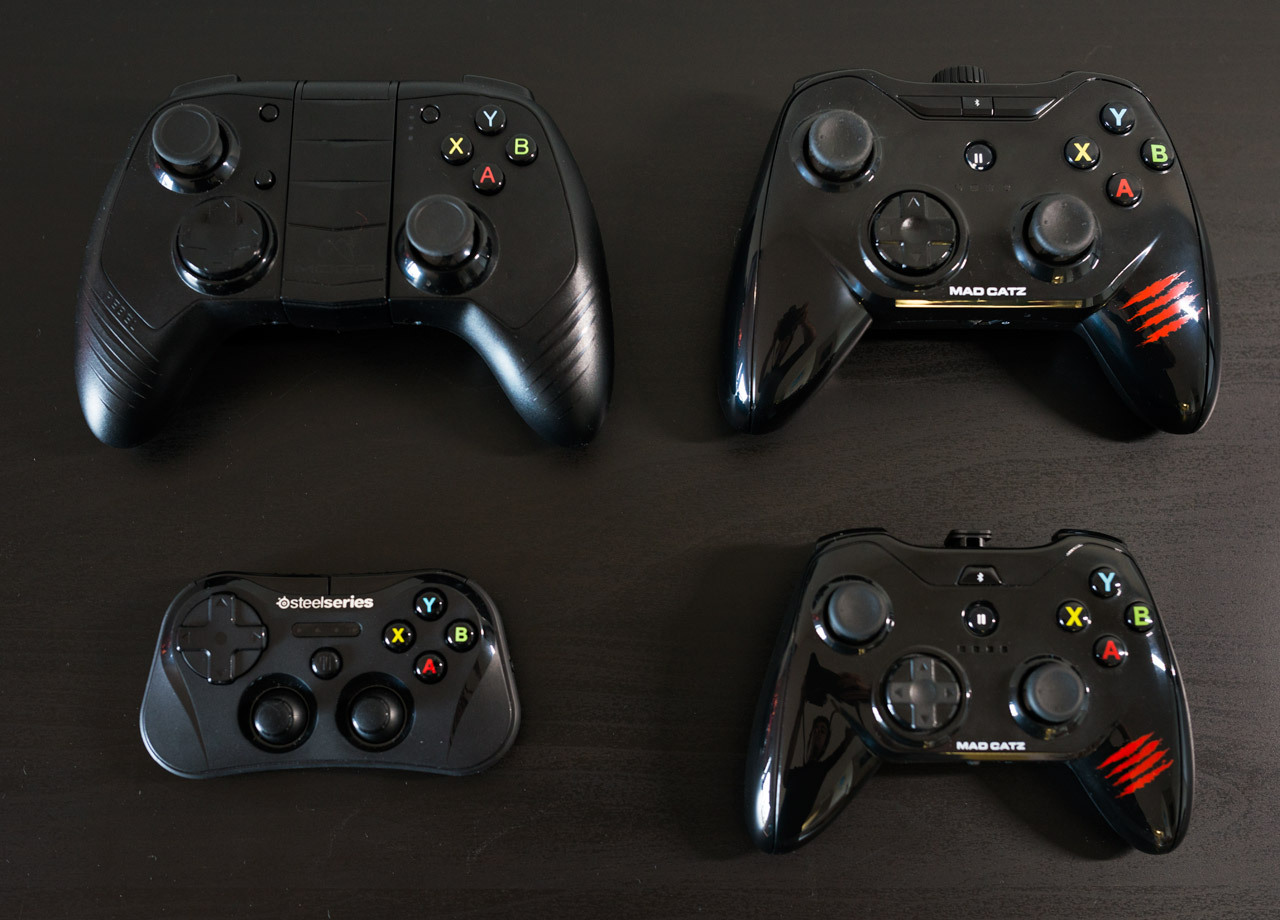
Conclusion
Mad Catz finds themselves in a strong position leading into the holidays. SteelSeries and MOGA may have had an early release advantage, but they dropped the ball when it came to software. New contenders like the Horipad and Stratus XL work well, but feature many design differences from the C.T.R.L.i line that might take them out of contention for a lot of gamers. The simple fact of the matter is, the Micro C.T.R.L.i and regular C.T.R.L.i are the only Xbox style iOS controllers that actually work right now.
So the question comes down to which Mad Catz controller to get. As Iâve covered in a separate review, the Micro C.T.R.L.i has some advantages over itâs full-size brother (which was covered in a separate review), but the larger C.T.R.L.i brings a lot to the table to justify itâs higher price..
For iPhone gamers looking to clip their phones into a controller, I think the full-size C.T.R.L.i is the way to go. The C.T.R.L.i is a lot heavier and larger than the Micro version, but at the same time, the clip on the Micro version is really poor quality. If youâre planning to attach your iPhone to your MFi controller, youâre going to be a lot happier with the screw-on clip of the larger C.T.R.L.i. At the same time, while the increased weight of the larger controller hampers portability a bit, it is nice to be able to set your controller+iPhone down without the whole thing toppling over under itâs own combined weight. Considering that no upcoming MFi controllers even have a clip, this will likely remain the best MFi controller for iPhone gamers for some time.
For iPad gamers, where a clip isnât required, there are more options. The Horipad, with itâs excellent d-pad, will likely be the best choice for retro gamers. The Stratus is an extremely pocketable controller with a full layout. The upcoming Gamevice is a killer looking controller-case for the iPad. Still, I have a suspicion that most potential MFi controller customers are probably coming from using the Xbox as their primary game console, and are looking to translate that gaming experience on to the iPad. For them, the C.T.R.L.i is as good as you could hope for: a well built, reasonably priced, excellently designed controller that feels like an Xbox 360 pad. If that sounds like exactly what youâve been looking for, youâre going to absolutely adore the C.T.R.L.i.